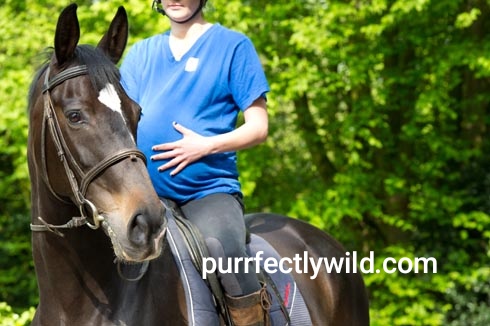Pregnancy is a period of great joy and anticipation associated with some worries too, especially concerning physical activities. One of the questions for any woman passionate about horseback riding is, “Can you keep on horse-riding while pregnant? Find out more about the dangers and precautions surrounding horse riding while pregnant to make an informed choice as a mother-to-be.
Understanding the Basics of Horseback Riding During Pregnancy
Horseback riding is a physical sport that demands good balance, strength and coordination. A rider should have a strong link with his movements and also to be able positive changes in real time. Pregnancy brings about the most substantial of all physical changes to a women; radically altering her balance, joint integrity and centre-of-mass. This can affect a rider´s ability to maintain good form and that they are responding well in dangerous situations.
Riding Your Horse While You’re in Pregnancy: Can It Be Done?
This is, above all else, not a question for you to answer on your own. As always, we encourage you to ask your healthcare provider first as they can provide the best recommendation for whatever you need in terms of individual health needs and situation.
It has been our promise as horseback riding professionals, and instructors across the board an a mothers to be safe with their children in both lesson horses or student owned property so we kept this article short but filled it up with some of our best tips. But what about the answer? It would be:
No — Over 12 Weeks Pregnant
The American College of Obstetricians and Gynecologists tends to discourage pregnant women in their later stages of pregnancy (after the first trimester) from horseback riding.
Risk of abruption increases past the first period Placental abruption — in this kind of a situation, the placenta gets separated from the uterus which can lead to major issues for both mother and child. The physical stress and strains of riding can make injuries like these more likely to occur.

Yes, for pregnant women in the 1st trimester
On the other hand, if you are no longer in your first trimester and already have experience with horseback riding it may still be a consideration. Before the pregnancy goes into dangerous territory (which is usually later in 3rd trimester stage) then it should be safe – because at that point a lot of soft tissue and muscle protect your womb:- look at this horse. But it is vital that you do this carefully if in doubt speak to your GP.
The Risks of Horseback Riding During Pregnancy
The Danger of Falling
One important issue related to horse riding while pregnant is the risk of falling. And finally, horses are very unpredictable creatures and no matter how perfect of a ride you may be having as soon as your ass is on that saddle there is only so much an experienced rider can predict or expect from their horse. A quick move, noise, or a surprise object can scare them into falling. Falling injuries can be severe even life-threatening, especially for pregnant women who may suffer from abdominal trauma due to falling, causing some serious complications including placental abruption or a miscarriage and preterm birth.
Impact on the Pelvic Area
Horseback riding being a continuous movement has an impact on the pelvic region. Joint pain gets worse towards the end of pregnancy because those ligaments naturally loosen up a bit and prepare loose for labor, making your pelvis more vulnerable. That constant motion and the vibrations from horseback riding can result in both discomfort for mom, as well as possible harm to her growing baby.
Changes in Heart Rate and Physical Stress
As horseback riding is a physically demanding activity, it can raise the maternal heart rate by quite some margin. Physical activity should not be excessive or result in overheating during pregnancy. You might reduce the oxygen supply to your baby because high heart rates limit blood flow towards the uterus.
Change in weight distribution (the baby resting on the beefy lady’s pelvic bone)
More advanced balancing and coordination during horseback riding to remain in the saddle, and steer horse efficiently. Changes mother-to-be endure as a natural part of pregnancy hinder her ability to safeguard balance while on foot and raise the probability of slipping.
Hormonal Changes
Hormonal fluctuations as seen in Relaxin levels ( pregnancy hormone) make ligaments and joints softer for flexibility preparing the body to go into labor. This is good for labor but it puts riders at risk of joint injuries. A less stable weaker joints are more prone to strain while horse riding.
Safety Guidelines for Horseback Riding During Pregnancy
Although the risks with pregnant horseback riding is high, there are still some women who may continue to ride a horse, especially if in an early pregnancy. Since some would wish to go on riding and it is their right, stringent safety considerations should be adhered for practices that can keep risks at minimal.

1. Consulting your healthcare provider:
It is important to consult with your health care provide before continuing or beginning any form of exercise during pregnancy, including horseback riding. They can evaluate your unique circumstances, take any preexisting health conditions into account and offer you individual advice about riding during pregnancy.
2. Ride Only in the First Trimester:
Many routine doctors suggest that riding be permitted only during the first trimester. You are pretty safe from a fall during the first trimester because your uterus is securely tucked away inside your pelvic cavity. During pregnancy the more riskier is because they are great changes in your body as increase of uterus size, during this time you might suffer from abdominal injury very easy.
3. Ride a Calm, Trained Horse:
If you choose to ride during pregnancy, be sure it is a calm and well-trained horse that you have had experience with. Don’t ride young or erratic horses that may spook easily and need harder control. A safe, solid horse reduces the chances for a quick movement that may make you lose your balance and fall.
4. Stay Away from Jumping and Fast-Riding:
High-impact motorcycling activities like jumping or galloping is not recommended while pregnant. Such activities can precipitate falls, and put more stress on the body. Unless your doctor has advised otherwise, stick to light riding in controlled surroundings such as an indoor arena or a flat field.
5. Wear Adequate Riding Gear:
As relevant always, adequate riding gears are now even more important during pregnancy. Helmets are important to prevent head injuries in case of a fall. A helmet must conform correctly for it be as effective as possible; so make sure you find the right fit! You could also choose to wear a supportive maternity riding vest that will provide additional protection for your stomach and lower back.
6. Let Your Body Be the Guide:
No two pregnancies are equal as a pregnancy can be unpredictable. Listen to what your body is saying and know when it has reached its saturation. If you are feeling out of breath, wobbly or pain while riding it is absolutely necessary that you get off the bike and have a rest. Do not over exert yourself as this could endanger you and your child.
7.Stay Hydrated
As with any physical activity, it is crucial that you remember to stay hydrated and avoid overheating when riding. Stay hydrated by drinking water before, during and after your ride to help stay cool and prevent dehydration. Ride when it is cooler, in the early morning or late afternoon. This minimizes chances of collateral damage from over-exertion.
8. Opt For Other Activities:
If the risks and considerations of riding during pregnancy feel too high for you then try to switch to other activities which will provide physical movement while providing similar enjoyment without those associated hazards. Some of these activities include walking, swimming and practicing prenatal yoga. Posture exercises are beneficial for your core and help with weightlifting technique while preventing injury (by improving form).
Conclusion
With your doctor’s supervision and clearance, you can safely enjoy horseback riding while pregnant. Here are some safety guidelines to follow. We would love to welcome you and your family during this exciting time if you’re ready to explore this experience.
Your safety and enjoyment are our top priorities. Our friendly paint horses, vets in Longdenburgh, and experienced riding instructors will ensure both. We aim to bring fun to all stages of life, and we look forward to meeting your new family member in the future. Contact us for more details about rides and safety practices.
FAQs.
Here are five FAQs related to horseback riding during pregnancy:
1. Is it safe to ride horses during pregnancy?
While some experienced riders may feel comfortable continuing, horseback riding during pregnancy is generally considered risky due to the potential for falls and abdominal trauma. It’s best to consult your healthcare provider.
2. What are the risks of horseback riding while pregnant?
The main risks include falling, which can lead to injury or miscarriage, and the horse’s unpredictable behavior. These risks increase as pregnancy progresses.
3. Can I ride horses in early pregnancy?
Some women may choose to ride during the early stages of pregnancy. But it’s essential to assess the risks and speak with your doctor. The first trimester is a critical time for fetal development.
4. What safety precautions should be taken if riding while pregnant?
If you decide to ride, make sure to wear proper safety gear, stick to gentle, familiar horses, and avoid jumps or uneven terrain. Listen to your body and stop if you feel uncomfortable.
5. When should I stop riding during pregnancy?
Most doctors recommend discontinuing horseback riding as soon as pregnancy is confirmed. Especially as the pregnancy progresses and balance and coordination become more challenging.

